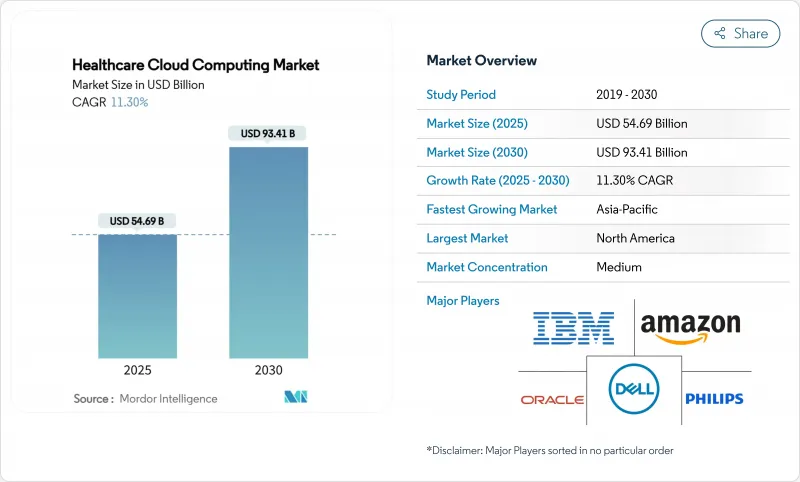
|
市場調査レポート
商品コード
1851246
ヘルスケアクラウドコンピューティング:市場シェア分析、産業動向、統計、成長予測(2025年~2030年)Healthcare Cloud Computing - Market Share Analysis, Industry Trends & Statistics, Growth Forecasts (2025 - 2030) |
||||||
カスタマイズ可能
適宜更新あり
|
|||||||
| ヘルスケアクラウドコンピューティング:市場シェア分析、産業動向、統計、成長予測(2025年~2030年) |
|
出版日: 2025年07月30日
発行: Mordor Intelligence
ページ情報: 英文 130 Pages
納期: 2~3営業日
|
概要
ヘルスケアクラウドコンピューティング市場規模は2025年に546億9,000万米ドルに達し、CAGR 11.3%を反映して2030年には934億1,000万米ドルに成長すると予測されています。

医療システムがレガシーサーバーから、リアルタイム分析、ゲノムワークロード、遠隔医療トラフィックを処理できるスケーラブルなAI対応クラウドプラットフォームへとシフトしていることが、この拡大を後押ししています。EUのHealth Data Space規則に代表されるデータ共有のための規制の後押しが、インフラストラクチャの近代化を急がせる一方、最大手のハイパースケールプロバイダーにおけるデータ消去料金の廃止が総所有コストを改善します。病院は季節的な繁忙期にクラウドの弾力性から利益を得、支払者はマルチクラウド環境で収益サイクルの自動化を実行することで請求裁決コストを削減します。臨床医は、放射線診断のトリアージやアンビエント・ドキュメンテーションにクラウドベースのAIをますます利用するようになり、ハイパフォーマンス・コンピューティング容量に対する需要が増加しています。
世界のヘルスケアクラウドコンピューティング市場の動向と洞察
ヘルスケアにおけるIT導入の増加
病院、診療所、診断ネットワークは現在、デジタルトランスフォーメーションを危機対応ではなく、中核的な戦略的テコとして扱っています。最新のクラウドプラットフォームは、老朽化したオンプレミスのデータセンターに取って代わり、小規模な医療機関のITチームではほとんど対応できなかった冗長性、即時プロビジョニング、自動パッチ適用を実現します。パンデミック時代の遠隔医療への投資は、クラウド上で実行されるスケーラブルなビデオ、ストレージ、AIトリアージに依存する本格的なバーチャルケアエコシステムへと発展しました。医療システムは、リアルタイムのダッシュボード、IoMTデバイスのフィード、ベッドサイドで敗血症や悪化のアラートを表示する予測モデルを中心に、臨床ワークフローを再構築します。地方の小規模病院では、マルチテナントのSaaS型EHRを利用して、かつては学術センターの予算が必要だった意思決定支援ツールにアクセスしています。統合された医療提供ネットワークは、共通のデータファブリックを追求し、臨床医が施設横断的な診察の際に統一された縦断的記録を見ることができるようにしています。
クラウドのコスト削減とスケーラビリティの利点
資本集約的なハードウェアの更新サイクルをなくし、従量課金のコンピューティングに移行することで、米国の病院がマージン縮小期にある中、予算の圧迫を軽減することができます。主要なハイパースケール・プロバイダーは2024年に退出手数料を取りやめ、マルチクラウド退出の障壁を下げ、CIOの交渉力を強化。弾力的なインフラは、過剰なプロビジョニングを行うことなく、集団予防接種の実施時や請求書提出のピーク時のトラフィック急増を吸収。パッチ適用、バックアップ、高可用性アーキテクチャのアウトソーシングにより、社内のスタッフはより価値の高いデータサイエンス業務に専念できます。支払機関は、クラウド・ネイティブのルール・エンジンが1分間に数万件の請求を処理することで、裁定の所要時間を短縮し、会員への払い戻しの迅速化につながります。クラウドによるコスト削減は、エネルギー削減やデータセンターの不動産売却にも反映され、プロバイダーの持続可能性の目標にも合致します。
データ・セキュリティと完全性への懸念
病院に対するサイバー攻撃が急増し、設定ミスのオブジェクト・ストレージやパッチ未適用のAPIを狙ったランサムウェア・クルーが発生。情報漏えいはHIPAAの罰金、集団訴訟、取締役会レベルの監視を引き起こし、クラウド移行の承認前にセキュリティ監査が必要となります。CIOは責任共有モデルと格闘し、ID管理、ロギング、暗号化の強化における自らの役割を過小評価することもあります。大規模な情報漏えいが発生すると保険料が高騰し、変革の予算に隠れたコストが上乗せされます。規制当局は、監査証跡とインシデント報告スケジュールの厳格化で対応し、サイバーセキュリティ専任の人材を持たない小規模コミュニティ・プロバイダーのコンプライアンス・オーバーヘッドが増加します。
セグメント分析
臨床情報システムは2024年の総支出額の約半分を占め、EHR、PACS、放射線ワークフローが患者の安全にとって重要であることを反映しています。臨床ワークロードのヘルスケアクラウドコンピューティング市場規模は、認定EHRテクノロジーを義務付け、品質報告のしきい値を設定した連邦政府の景気刺激策の恩恵を受けました。クラウドホスト型EHRは、即座のアップグレードと統合された臨床判断プラグインを提供し、医師の満足度を向上させています。画像診断部門は、CTやMR検査をクラウドAIサービスにルーティングし、重要な所見にフラグを立てることで、所要時間を短縮しています。
非臨床アプリケーションは、否認率を削減するクラウドベースの収益サイクル分析を財務部門が求めるにつれて拡大します。医療システムは、SaaS型請求プラットフォームを導入し、新規登録時に拡張することで、会員の増加に対応した請求処理を実現しています。人事チームは、クラウドのスケジューリングと給与計算エンジンを使用して、出張看護師や遠隔地のコーダーを地理的なコンプライアンスに従って管理します。ヘルスケアクラウドコンピューティング市場の予測サプライチェーンダッシュボードは、医薬品不足を予測し、ジャストインタイムの在庫を最適化することで、臨床プログラムのための資金を確保します。
プライベートクラウドは、多くのプロバイダーがPHIを多用するワークロードをハードウェアレベルで分離されたシングルテナント環境に置くため、過半数のシェアを維持しています。ゲノム研究クラスタや集中治療テレメトリーを実行する調査機関は、ソブリンデータ規則を満たすために専用インフラを選択します。カスタマイズ可能なファイアウォールとオンプレミスのアディショナル・ノードにより、CISOはきめ細かなポリシーを適用できます。
パブリック・クラウドは、プロバイダーがハイパースケーラーが提供するHITRUST、GDPR、HDS認証に自信を深めた後、急速に加速します。イグレス料金の撤廃とコンフィデンシャル・コンピューティング・チップセットの登場により、ベンダーロックの懸念が緩和されます。多くのIDNはハイブリッド・パターンを採用しています。外科手術のビデオと遠隔測定は低レイテンシーを実現するためにローカルのプライベート・クラウドにストリームし、匿名化された調査データセットはAIモデルのトレーニングのためにパブリック・クラウドにレプリケートします。このバランスの取れたアプローチにより、クリティカルなワークロードを近くに置きながら、ハイパースケールの経済性を二次分析に活用することができます。
地域分析
北米のシェア48.75%は、長年のEHR義務化と、ヘルスケアに特化したコンプライアンス・ツールキットを備えたすべてのトップ・ハイパースケーラの存在を反映しています。米国の医療システムでは、ディザスタリカバリをクラウドに移行する動きが加速しており、オンプレミスのフロアスペースを収益を生み出す臨床部門に割り当てています。カナダの各州は、ハイパースケールの主権を持つリージョンに集中画像アーカイブを導入し、遠距離の遠隔画像診断をサポートしています。
欧州では、相互運用可能な標準と患者のアクセス権を規定した欧州医療データ空間規制の恩恵を受けています。クラウドプロバイダーは、C5とGDPRコードに認証されたEUベースのアベイラビリティゾーンを追加開設することでこれに対応し、病院が居住法に違反することなくサイロを統合できるようにします。ドイツの官民コンソーシアムは、プライベート・クラウドでホストされるFHIRベースのがん登録を試験的に導入し、ランダー全体でフェデレーションすることで、研究データの深度を向上させています。スカンジナビアのシステムは、再生可能エネルギーの高い送電網を活用し、国の気候目標に沿ったカーボンニュートラルなクラウドデータセンターに電力を供給しています。
アジア太平洋は、ヘルスケア支出の増加とスマートフォンの普及により、CAGR最速の19.45%を記録。インドの国家的ABDMデジタルヘルススタックは、小規模クリニックが相互運用可能な電子カルテを発行できるようにする国内クラウド取引所に乗る。東南アジアでは、民間の病院チェーンが、パブリッククラウドの遠隔相談エンジンに依存したバーチャル・ファーストの保険プランを立ち上げています。オーストラリアのMy Health Recordは、クラウドFHIRサービスを通じて検査結果と画像診断結果を統合し、データの完全性と患者エンゲージメントを高めています。しかし、インドネシアの農村部では帯域幅の制約があり、中国ではデータのローカライゼーションのルールがあるため、地域によるばらつきは依然として残っています。
その他の特典:
- エクセル形式の市場予測(ME)シート
- 3ヶ月間のアナリストサポート
よくあるご質問
目次
第1章 イントロダクション
- 調査の前提条件と市場の定義
- 調査範囲
第2章 調査手法
第3章 エグゼクティブサマリー
第4章 市場情勢
- 市場概要
- 市場促進要因
- ヘルスケアにおけるIT導入の増加
- クラウドのコスト削減とスケーラビリティの利点
- 高度な分析とMLツールへの容易なアクセス
- クラウドネイティブな相互運用性を可能にするFHIRベースのAPIプッシュ
- リアルタイム臨床ゲノミクス分析ワークロード
- 市場抑制要因
- データの安全性と完全性に関する懸念
- 相互運用性と標準の欠如
- 高いエグレスフィーとベンダーロックインのリスク
- ポーターのファイブフォース
- 新規参入業者の脅威
- 買い手の交渉力
- 供給企業の交渉力
- 代替品の脅威
- 競争企業間の敵対関係
第5章 市場規模と成長予測
- 用途別
- 臨床情報システム(CIS)
- 電子カルテ(EHR)
- 画像保存通信システム(PACS)
- 放射線情報システム(RIS)
- コンピューターオーダーエントリー(CPOE)
- その他のCIS用途
- 非臨床情報システム(NCIS)
- 収益サイクル管理(RCM)
- 自動患者請求(APB)
- 給与管理システム
- その他のNCIS
- 臨床情報システム(CIS)
- 展開別
- プライベートクラウド
- パブリック・クラウド
- ハイブリッド・クラウド
- サービス別
- サービス型ソフトウェア(SaaS)
- インフラストラクチャー・アズ・ア・サービス(IaaS)
- プラットフォーム・アズ・ア・サービス(PaaS)
- エンドユーザー別
- ヘルスケア・プロバイダー
- ヘルスケアペイヤー
- 地域
- 北米
- 米国
- カナダ
- メキシコ
- 欧州
- ドイツ
- 英国
- フランス
- イタリア
- スペイン
- その他欧州地域
- アジア太平洋地域
- 中国
- 日本
- インド
- 韓国
- オーストラリア
- その他アジア太平洋地域
- 中東・アフリカ
- GCC
- 南アフリカ
- その他中東・アフリカ地域
- 南米
- ブラジル
- アルゼンチン
- その他南米
- 北米
第6章 競合情勢
- 市場集中度
- 市場シェア分析
- 企業プロファイル
- Amazon Web Services(AWS)
- Microsoft
- IBM Corporation
- Google Cloud
- Oracle
- Dell Technologies
- Siemens Healthineers
- Koninklijke Philips N.V.
- ClearDATA
- athenahealth
- CareCloud
- ZYMR
- OSP Labs
- Euris
- Google Cloud(Alphabet)
- Salesforce
- SAP SE
- Cisco Systems
- Medidata Solutions


